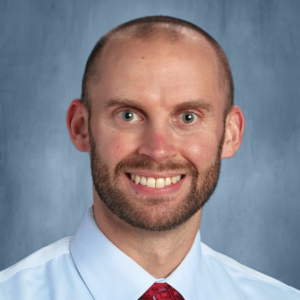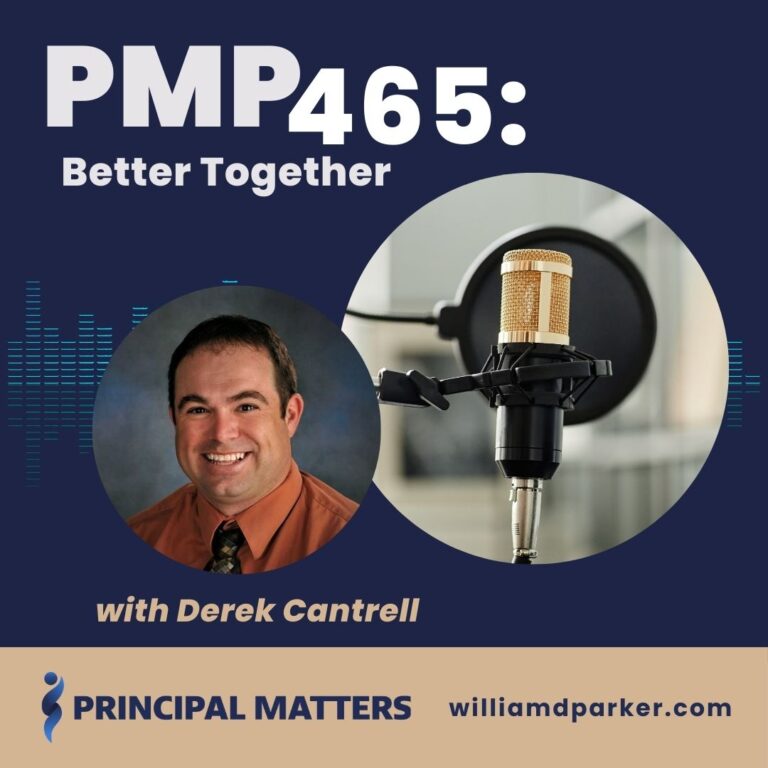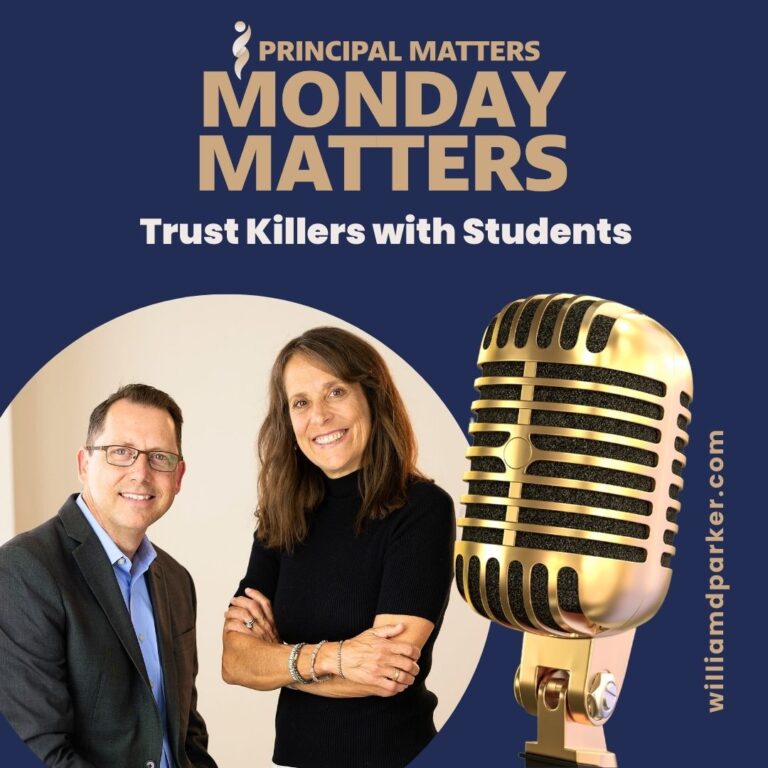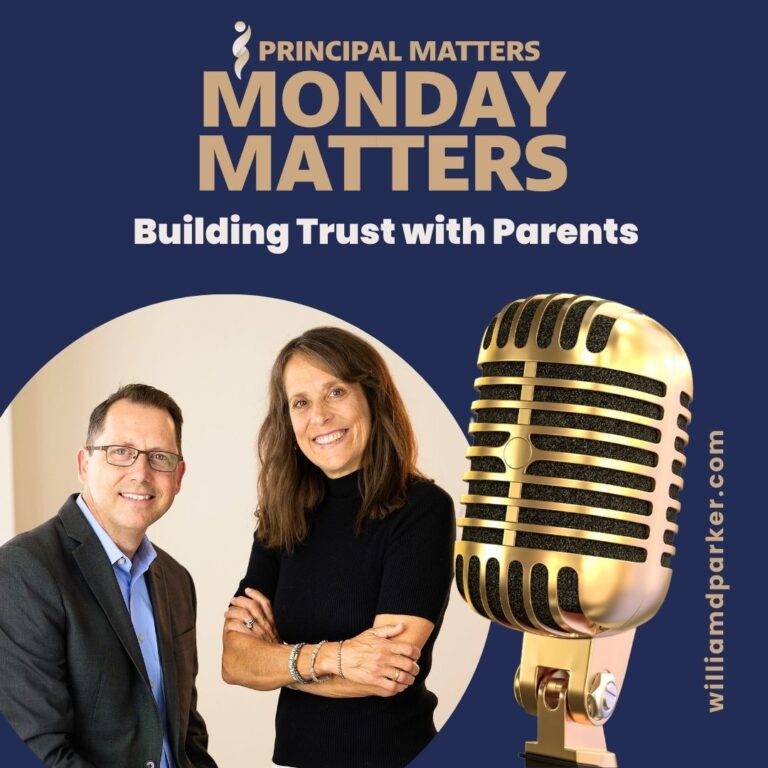Podcast: Play in new window | Download
A few thoughts from Will before this week’s show:
Hi, Friends. Will Parker here. A few remarks before we jump into today’s episode. First, many of you know Principal Matters is now my full-time venture. Beyond my collaborations with districts across the U.S., I’m thrilled to introduce the Principal Matters Grow Academy, tailor-made for dedicated listeners who want to develop capacity as decision-makers, communicators, team-builders, and more. Starting September 11th, 2023, and continuing every 2nd Wednesday through May, we’re offering 8 specialized 70-minute virtual sessions for leaders like you in various U.S. time zones. Spaces are limited to ensure quality interaction, so if you’re eager to join, drop me an email at will@williamdparker.com with the subject ‘Grow’ or go to the Services link on my website to fill out an application by the end of this month.
Also, don’t miss the Ignite+ virtual series by the National Association of Secondary School Principals. Jen Schwanke and I will dive deep into whole-school wellness over four sessions starting September 14th. You can register and access additional sessions with presenters Robyn Jackson, Principal EL, and Jimmy Casas at nassp.org/igniteplus.
Finally, a heartfelt shout-out to the wonderful school leaders with the Ohio School Sponsorship program, especially Sheila Vitale. It was an honor to facilitate a convocation day for them. Also, thank you to my friend Superintendent Justin Kana and the Morrision Public School faculty for hosting me to present on Pause. Breathe. Flourish. – as a part of their teacher professional development. If you want similar experiences, please reach out!
Thank you for your dedication to doing what matters. Now, let’s dive into the episode!
Let’s Meet John Boyd:
This week we have the pleasure of talking with John Boyd, a seasoned educator, dedicated community member, and avid runner.
John’s journey began as a middle school social studies teacher and has since blossomed into an illustrious career that led him back to his roots, Ste. Genevieve High School. Here, he spent seven years educating young minds before taking on the mantle of Assistant Principal. After three years in that role, John embarked on his current position as Principal, concluding his second year. John’s investment in his school community spans over 27 years in various capacities, from being a student himself to becoming an administrator. On top of his work at the school, John holds a spot on the Missouri State Principal’s Association Board of Directors. His exceptional leadership skills were recognized this year when he was awarded Missouri’s Jim L. King High School Principal of the Year Award. Outside of his career, John shares a joyful family life with his wife, Sierra, and their two children, J.B. and Emery.
Here’s a snapshot of what we discussed:
The Runner’s Life
John shares his running journey that began in high school and college and eventually became a catalyst for his career in education. He reminisces about his participation in the 2019 Boston Marathon and his attempt at a 50-mile race.
Ste. Genevieve – A Community’s Story
John talks about life in Ste. Genevieve, the oldest town west of the Mississippi River. He praises the town’s close-knit community and his proud work at Ste. Genevieve High School, a National Banner School for Inclusive Practices.
Leading Your Hometown School
John discusses the unique challenges and rewards of leading in his hometown school. He speaks about managing expectations, knowing the traditions and people, and his unwavering commitment to his community.
Sustaining Leadership Over the Long Term
John emphasizes the importance of finding a personal outlet, having an accountability partner, loving what you do, and the role of a supportive family in enduring leadership.
Advice for Fellow Leaders
As a leader, John highlights the importance of relationships, celebrating all achievements, modeling effective classroom strategies, and fostering a caring culture.
The Importance of Ongoing Learning
Discussing executive coaching, John stresses the danger of complacency and the significance of continuous growth for himself, his students, staff, and the community.
Final Thoughts and Contact
In conclusion, John reiterates his passion for education and leadership. He extends an open invitation for others to connect with him via email at jboyd@sgdragons.org.
For all this and more, tune in to the entire conversation. You won’t want to miss these insightful takeaways from John Boyd!
Will Parker and guest John Boyd discuss school management and leading your hometown high school in this week’s episode of PMP.
Will Parker and guest John Boyd discuss school management and leading your hometown high school in this week’s episode of PMP.
Three Leadership Takeaways with Dr. Nick
Principal Matters is proud to include contributing posts from Dr. Nick Davies, an elementary associate principal for Vancouver Public Schools. He is a Principal Matters Associate and posts his own weekly podcast version of the following content at “Monday Mornings with Dr. Nick” which can be found at https://www.linkedin.com/in/nick-davies-education/

“Be Humble and Don’t be a Jerk!” by Dr. Nick Davies
I met with Kim Marshall two separate times a few months ago. I normally don’t meet with leaders during the school day, but the way our schedules matched up, it was one of the only times we could make it work. Well, that serves me right! Within minutes I was called out to address a major student issue. So, we met again a couple of weeks later (not during the school day). Kim writes the Marshall Memo, and he says in a given week he will read roughly 150 articles each week and then narrows it down to around 8 that he focuses on for his memo. He has been doing this for awhile now, and he has a wealth of information on best practices for schools! Kim was interviewed on the Principal Matters Podcast on Episode 168.
Spread Your Net
When you are looking to do something new as a leader, where do you get your information? Do you have a go-to source or person? Kim encouraged me to always “spread your net” when it comes to information. “Good ideas are not all in once place.” One of the habits that has helped him across his career has been that he is a voracious reader. He follows interesting ideas and looks for whatever information he can find about that topic. Kim gave the example of a school leader who read about a strategy, Thinking Classrooms, in the Marshall Memo, expertly put it to use, and now kids are benefiting from it. Resources like the Marshall Memo take many ideas and many resources to save people time and expose them to great ideas.
What percentage of the time are you doing things that you like?
One of the things that I love about talking with leaders, particularly those who coach others as part of their job, is that they don’t just give me advice and answer questions. They often can’t help but ask me questions and then start asking coaching follow up questions. Kim asked me what percent of the time I do things I liked, and then we dove into what that means for being a sustainable principal. He is a veteran school administrator and talked about how the principal job is a 24/7 role. So much of the job can be challenging and often it is just trying to get the plane off of the runway, so to speak. How can you increase the percentage of time that you do things you enjoy while still getting the job done? The answer is different for everyone, but he had one piece of advice: Always teach when you are a principal! We all got into education to help students, and the best way to still be connected to the core of what we do is to be in the classroom with students. A principal’s schedule is never the same, so teaching can be challenging. His suggestion was something like Sex-Ed. Teachers don’t always want to teach it, and it is only a small part of the curriculum during a portion of the year.
The Power of Formative Assessments
Formative assessments are those in-the-moment adjustments that teachers make in the classroom. The best teachers do it instinctively, but Kim said that oftentimes it is the weakest thing seen in the classroom. The best formative assessments happen in the moment to make changes to what is currently going on. This means that exit tickets, although valuable, might be too late. This is an idea of constant adjustment and improvement, and it can extend to teachers as well. If teachers use common assessments, then they can meet and go over scores. The crucial part of this, however, is that you need a culture of sharing mistakes and teachers being willing to say, “You’re kids did better. What did you do?” Additionally, administrators need to be in classrooms and coach teachers along the way.
Thank you, Kim, for your time and advice!
Thank you for doing what matters!
Sincerely, Dr. Nick




